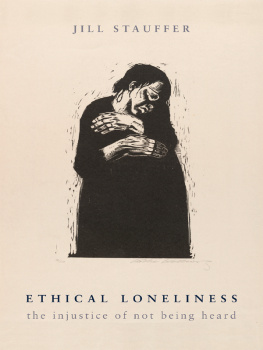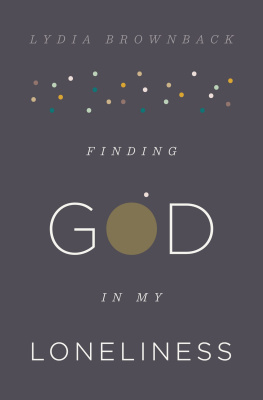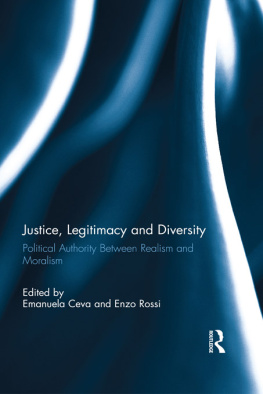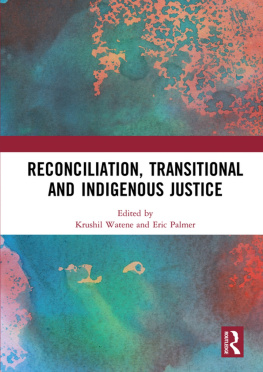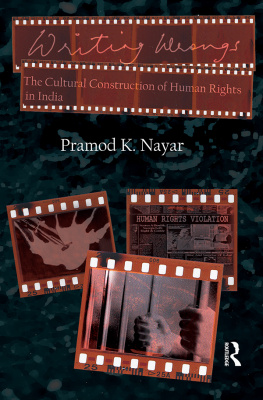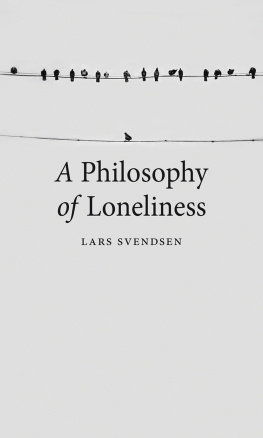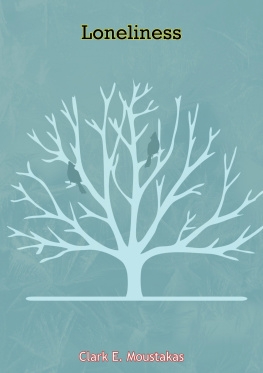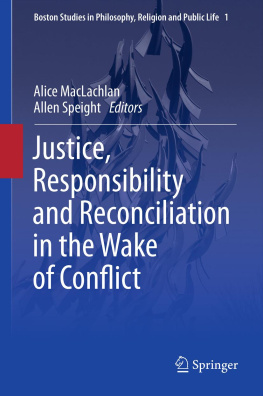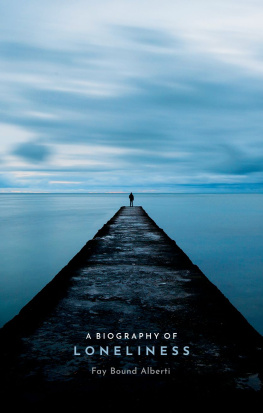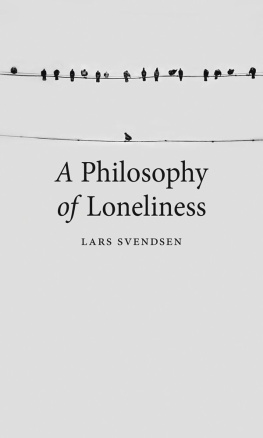ETHICAL LONELINESS
published with a grant from
FIGURE FOUNDATION
comes an adjournment of sorrow
ETHICAL LONELINESS
the injustice of not being heard
JILL STAUFFER
COLUMBIA UNIVERSITY PRESS NEW YORK
COLUMBIA UNIVERSITY PRESS
Publishers Since 1893
NEW YORK CHICHESTER, WEST SUSSEX
cup.columbia.edu
Notes Toward a Supreme Fiction from The Collected Poems of Wallace Stevens by Wallace Stevens 1954 by Wallace Stevens and copyright renewed 1982 by Holly Stevens. Used by permission of Alfred A. Knopf, an imprint of the Knopf Doubleday Publishing Group, a division of Random House LLC. All rights reserved.
Copyright 2015 Columbia University Press
All rights reserved
E-ISBN 978-0-231-53873-2
Library of Congress Cataloging-in-Publication Data
Stauffer, Jill, 1966
Ethical loneliness : the injustice of not being heard / Jill Stauffer.
pages cm
Includes bibliographical references and index.
ISBN 978-0-231-17150-2 (cloth : alk. paper) ISBN 978-0-231-53873-2 (e-book)
1. LonelinessPhilosophy. 2. LonelinessMoral and ethical aspects. 3. Persecution. 4. Oppression (Psychology) I. Title.
B105.L65S73 2015
172.1dc23
2015001677
A Columbia University Press E-book.
CUP would be pleased to hear about your reading experience with this e-book at .
COVER IMAGE: KTHE KOLLWITZ, THE WIDOW I FROM WAR ARS
COVER DESIGN: CHANG JAE LEE
References to websites (URLs) were accurate at the time of writing. Neither the author nor Columbia University Press is responsible for URLs that may have expired or changed since the manuscript was prepared.
The tortured person never ceases to be amazed that all those things one may, according to inclination, call his soul, or his mind, or his consciousness, or his identity, are destroyed when there is that cracking and splintering in the shoulder joints.
Jean Amry
The word I means here I am, answering for everything and for everyone.
Emmanuel Levinas
But the difficultest rigor is forthwith,
On the image of what we see, to catch from that
Irrational moment its unreasoning,
As when the sun comes rising, when the sea
Clears deeply, when the moon hangs on the wall
Of heaven-haven. These are not things transformed.
Yet we are shaken by them as if they were.
We reason about them with a later reason.
We reason of these things with later reason.
And we make of what we see, what we see clearly
And have seen, a place dependent on ourselves.
Wallace Stevens
Contents
In Beyond Good and Evil, Nietzsche wrote, A thought comes when it wishes, and not when I wish, so that it is a falsification of the facts of the case to say that the subject I is the condition of the predicate think. I think about that a lot. It means, among other things, that the ideas of this book owe much to many interlocutorsa large number of persons, the conditions in which I live, even the passing of time. Nietzsches reminder is also reflected in the themes of the book, from Jean Amry learning in the hardest way imaginable that the life of the mind is not possible absent human community, to how, in the writing of the book, the ideas took their most interesting turns when I pushed myself to translate the argument for widely different audiences, to how none of this would have been possible absent the gift (and luxury) of time for writing.
It began when Oona Eisenstadt invited me to present a paper at a colloquium on contemporary Jewish philosophy at Pomona College in December 2010. I thought to myself, I am not qualified for this. Oona insisted, and so I revised my thought and said to myself, I suppose it is time for me to figure out how to put Jean Amry in conversation with Levinas. That paper was my first draft of the concept of ethical loneliness.
A second push came from Peter Rush at the Law School at the University of Melbourne in Australia, who asked me to give a plenary address at a July 2011 conference called Affective States of International Criminal Justice. Looking at loneliness and legal response to violence through the lens of affect and its transfer helped me refine my argument about the selfs intersubjective formation. The participants in the conference, a response to my paper by Shaun McVeigh, and the faculty and graduate students at Melbourne engaged with the work in progress in deeply helpful ways.
Then I was invited, in October 2011, to speak at a conference honoring the work of Linda Ross Meyer, where engaging with the serious challenge her work on mercy poses to the gut sense I was developing that resentment could also be restorative led me to begin to develop the ideas about hearing that are so central to this books argument.
I owe singular thanks to James Martel, Claire Katz, and Gustavus Stadler, all of whom read the full manuscript and offered helpful support and critiqueeach showed me in different ways both what I knew I was doing with the book and what I didnt. Each moved me with the intelligence and generosity of their comments, and opened windows for me into my own thinking.
I am also indebted to two anonymous reviewers for Columbia University Press, whose vital comments advanced my thinking about some aspects of the project, and to Wendy Lochner and Christine Dunbar, for supporting this book and shepherding it through the publishing process. Donovan Schaefer, Raji Mohan, Tina Zwarg, Lisa McCormick, and Gus Stadlerall members of a faculty seminar on affect theory at the Hurford Center for the Arts and Humanities at Haverford Collegeread early versions of the chapters on ethical loneliness and revision, and their comments helped me think through the project during a key stage in my writing of it. Finally, most of the book came into being during a sabbatical leave provided by Haverford College. I used to think I could make writing happen no matter what constraints the outside world threw at me. Having a year to sink deeply into a demanding project taught me that some forms of thinking and writing need that buffer of space and time around them. To recast Nietzsches counsel: thought doesnt come when Im ready for it, it comes when it is readybut that means one needs to provide a space where it might arrive.
During the years I worked on this book, I was invited to present work from it at Bard Colleges Human Rights Project lecture series, Yale Law Schools Human Rights Workshop, a conference at McGill University on The Art and Politics of Irony, Johns Hopkins Universitys WGS workshop on Law and Loss, a colloquium on Laws Counter-Archive at the Birkbeck School of Law at the University of London, Rowan Universitys Theorizing Rowan series, and as a plenary address at the 2014 meeting of the North American Levinas Society. Every audience I encountered pushed the ideas along in productive and illuminating ways.
I also presented work in progress at meetings of the Association for the Study of Law, Culture and the Humanities, an interdisciplinary group that has been an important intellectual home for me; the Levinas Research Seminar, another rigorous and generative scholarly community; the Critical Legal Studies conferences in Stockholm, Sweden, and Belfast, Northern Irelandso full of the best kinds of challenge to settled thought; the Society for Phenomenology and Existential Philosophy, a philosophical home; and the American Political Science Association, where I am always reminded of how far work in political theory can extend. Every meeting I attended illuminated for me how important it is for working scholars to talk to one another about matters large and small.

